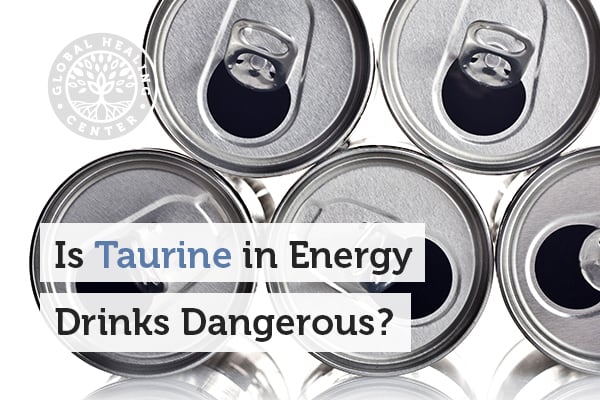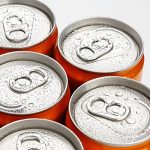
The multi-billion dollar phenomenon of energy drinks has captured the attention of scientists and nutritionists across the country. One of the main reasons is taurine, a common ingredient found in the caffeine and sugar-laden concoctions.
What Is Taurine?
Taurine is a free form amino acid contained in foods and manufactured in the body from the amino acid cysteine. It was first discovered in the bile of bulls and is now produced synthetically by the truckload. Since taurine is created naturally in the human body, a good diet supplies all you need.
Because taurine is utilized by the body during exercise and in times of stress, it's become a popular ingredient in energy drinks. Taurine shows an anxiolytic effect on the central nervous system, causing a possible reduction of anxiety symptoms associated with caffeine intake. While this may sound beneficial, perhaps it's not the best thing to intake when seeking energy for your daily tasks.
Taurine Side Effects
Taurine, mostly in its natural form, actually shows positive effects on the cardiovascular system, nervous system, and immune system. Since it has been shown to mitigate anxiety, it may counteract the effects of caffeine in energy drinks. Some argue that this may cause a person to feel unsatisfied with the lack of adrenalin they receive from the energy drink, causing them to reach for more caffeine. Could this lead to a vicious cycle of dependency? Probably not, but research has yet to conclude whether or not this is a serious issue.
Studies have implicated energy drinks in illnesses ranging from high blood pressure to strokes and seizures to heart disease. For these reasons, it's banned in some Scandinavian countries after being linked to the deaths of three consumers.
Is Taurine an Upper or Downer? Surprising New Research on the Brain
Scientists have known for a couple of years that taurine is involved somehow in the development and function of the brain. But recently they've discovered a more defined area of taurine's neurological activity. In a recent article from MedicalNewsToday.com, researchers at Weill Cornell Medical College in New York say they were "surprised" to find taurine "extraordinarily active" on brain receptors [1].
Even though taurine is known to be a key amino acid, the researchers say they're curious and puzzled still about the function of taurine in the brain, and have more questions than answers. They found taurine working deep inside the brain, in the "regulatory" area of the thalamus, interacting with neurotransmitters. The thalamus is involved in sleep/wake cycle pathways in the brain and other activities. "Its inclusion in these supplements is a little puzzling because our research would suggest that instead of being a pick-me-up, the taurine actually would have more of a sedative effect on the brain," the scientists said [2].
"Remarkably little is known about the effects of energy drinks on the brain. We can't even be sure how much of the taurine in the drink reaches the brain! Assuming that some of it is absorbed, the taurine – which, if anything, seems to have a sedating effect on the brain – may play a role in the 'crash' people often report after drinking these highly-caffeinated beverages. People have speculated that the post-Red Bull low was simply a caffeine-rebound effect, but it might also be due to the taurine content."
That's a huge concern because it's become trendy with young people to mix the drinks with alcohol. The daily serving of taurine should be between 100-500mg, and one can of a popular energy drink, for example, has 1000 milligrams of synthetically produced taurine. Some people are drinking up to eight cans a day (8000mg of taurine), an amount that can have drug-like effects on the body. Current research on the interaction between taurine and caffeine, not to mention the interaction between these ingredients and alcohol, is nonexistent. Furthermore, mixing stimulants with sedatives, especially alcohol, is potentially risky.
Taurine: The Magic Bullet for Energy?
There's no magic bullet for strength and endurance. Energy – true energy – comes from a healthy diet rich in raw foods. I would recommend that you avoid energy drinks altogether, mostly for their high caffeine and sugar content. Treat them like soft drinks, or even worse. The lofty claims on these drinks for instant vitality are simply outrageous. A good, varied diet of whole organic live foods gives you all the taurine you need, without the highs and lows of energy drinks. Natural taurine is beneficial for the body and can be found in milk, meat, fish, eggs, and seaweed. The daily allotment of taurine should be no higher than 500mg; however, higher amounts from food have shown no toxic effects. Make sure you exercise and get enough sleep, and remember, medicine and illness can zap your energy. Stay properly hydrated with lots of purified water, especially when you're exercising hard or you're stressed. It's a good idea to drink lots of water regardless. Take a pass on the "crash and burn" high from caffeine and sugar – and taurine. The ingredients of these drinks, both mysterious and some not too mysterious, are a recipe for disaster. They may "give you wings," but you'll soon come tumbling down – and in the long run, crash hard.
Alternative to Taurine and Energy Drinks
Everyone needs a boost once in a while, some more often than others. However, I urge you to avoid toxic energy drinks at all times. Instead, eat plenty of energy foods. This means fruits and vegetables — nature’s turbo boosters. Consider taking a Vitamin B12 supplement, such as our organic, liquid B12. This certified organic liquid contains methylcobalamin and adenosylcobalamin, but also contains hydroxocobalamin for long-lasting, sustained support with 5,000 mcg of B12 per serving. It’s a healthy way to naturally promote energy production, without bringing you crashing down a few hours later.
References (2)
- n.p. Scientists Close In On Taurine's Activity In The Brain. Medical News Today. MediLexicon, Intl., 2008 January 18.
- Patrick Di Justo. What's Inside: Red Bull. Wired Magazine. 2007 June 26.
†Results may vary. Information and statements made are for education purposes and are not intended to replace the advice of your doctor. If you have a severe medical condition or health concern, see your physician.







